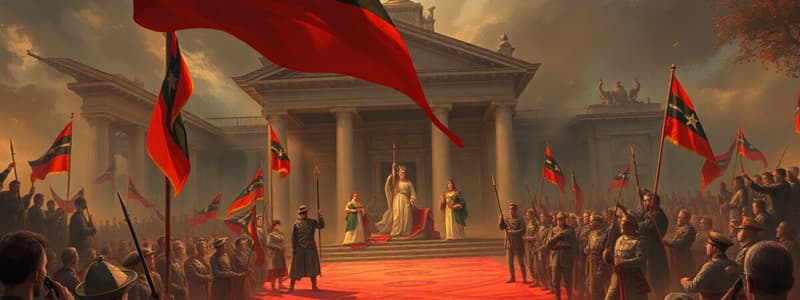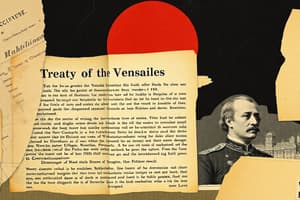Podcast
Questions and Answers
What distinguishes states from one another primarily?
What distinguishes states from one another primarily?
- The cultural diversity within each state
- The size of the population
- The level of political awareness among citizens
- The territorial basis of each state (correct)
Which statement best describes industrially developed countries?
Which statement best describes industrially developed countries?
- They are characterized by widespread poverty and lack of resources.
- They have low rates of literacy and high birth rates.
- They possess high literacy rates and balanced demographic trends. (correct)
- They often face significant political instability.
Which type of state is characterized by widespread problems such as transport and communication issues?
Which type of state is characterized by widespread problems such as transport and communication issues?
- Great powers
- Middle powers
- Underdeveloped countries (correct)
- Developing countries
How are middle powers best described in relation to great and small powers?
How are middle powers best described in relation to great and small powers?
Which of the following best categorizes the problems faced by developing countries?
Which of the following best categorizes the problems faced by developing countries?
What is a key characteristic of great powers according to modern political classifications?
What is a key characteristic of great powers according to modern political classifications?
What problems are typically associated with underdeveloped countries?
What problems are typically associated with underdeveloped countries?
Which of the following is NOT considered a characteristic of a middle power?
Which of the following is NOT considered a characteristic of a middle power?
What event directly contributed to Germany's dissatisfaction after World War I?
What event directly contributed to Germany's dissatisfaction after World War I?
Which country was attacked by Japan, marking the beginning of its military aggression in the 1930s?
Which country was attacked by Japan, marking the beginning of its military aggression in the 1930s?
What was one major reason for the League of Nations' failure to enforce the Treaty of Versailles?
What was one major reason for the League of Nations' failure to enforce the Treaty of Versailles?
What led to the uneasy alliance of the Allies during World War II?
What led to the uneasy alliance of the Allies during World War II?
What was a consequence of the German invasion during World War II?
What was a consequence of the German invasion during World War II?
Which cities were targeted by the United States for atomic bombings in 1945?
Which cities were targeted by the United States for atomic bombings in 1945?
What did the end of World War II result in regarding global power dynamics?
What did the end of World War II result in regarding global power dynamics?
What characterized the political entity that was the League of Nations?
What characterized the political entity that was the League of Nations?
What is the primary characteristic of military imperialism as described?
What is the primary characteristic of military imperialism as described?
Which definition of imperialism emphasizes the expansion of a state's power beyond its borders?
Which definition of imperialism emphasizes the expansion of a state's power beyond its borders?
Which of these methods of imperialism focuses on controlling the economic policies of weaker nations?
Which of these methods of imperialism focuses on controlling the economic policies of weaker nations?
What is a significant drawback of military imperialism?
What is a significant drawback of military imperialism?
How is cultural imperialism defined in the content provided?
How is cultural imperialism defined in the content provided?
What common feature distinguishes imperialism from other policies?
What common feature distinguishes imperialism from other policies?
Which statement best describes the vagueness of the term 'imperialism'?
Which statement best describes the vagueness of the term 'imperialism'?
Which of the following is NOT a method of imperialism mentioned?
Which of the following is NOT a method of imperialism mentioned?
What is the primary purpose of colonialism as opposed to imperialism?
What is the primary purpose of colonialism as opposed to imperialism?
How does the control exerted in colonialism differ from that of imperialism?
How does the control exerted in colonialism differ from that of imperialism?
Which motive is described as fundamentally connected to both imperialism and colonialism?
Which motive is described as fundamentally connected to both imperialism and colonialism?
What role does imperialism play in national defense?
What role does imperialism play in national defense?
Which of the following statements is true about the relationship between imperialism and colonialism?
Which of the following statements is true about the relationship between imperialism and colonialism?
Which historical leaders exemplify the desire for national prestige through imperialist expansion?
Which historical leaders exemplify the desire for national prestige through imperialist expansion?
What is one of the major criticisms of nationalism in the context of imperialism?
What is one of the major criticisms of nationalism in the context of imperialism?
In what way is colonialism considered an outflow of alien nationality?
In what way is colonialism considered an outflow of alien nationality?
What was one of the key actions that triggered the Cuban Missile Crisis?
What was one of the key actions that triggered the Cuban Missile Crisis?
Which policy introduced by Mikhail Gorbachev aimed at liberalizing the political landscape?
Which policy introduced by Mikhail Gorbachev aimed at liberalizing the political landscape?
What factor contributed to the economic strain on the Soviet Union leading up to its collapse?
What factor contributed to the economic strain on the Soviet Union leading up to its collapse?
What was the main objective of Perestroika?
What was the main objective of Perestroika?
Which event is cited as a drain on Soviet resources that contributed to its eventual collapse?
Which event is cited as a drain on Soviet resources that contributed to its eventual collapse?
What was a result of glasnost in the Soviet Union?
What was a result of glasnost in the Soviet Union?
What major change occurred after the Cold War ended in 1991?
What major change occurred after the Cold War ended in 1991?
What was a significant public sentiment in the Soviet Union leading up to its collapse?
What was a significant public sentiment in the Soviet Union leading up to its collapse?
Flashcards are hidden until you start studying
Study Notes
Post-World War I Changes
- Conservative social order in Europe collapsed, leading to a rise in Nationalisms.
- Germany emerged from World War I dissatisfied due to the Treaty of Versailles, imposing heavy reparations.
- Adolf Hitler gained support by promising to correct perceived injustices from the treaty.
- The League of Nations, established to enforce the Treaty, failed due to lack of U.S. involvement.
- Economic collapse and German Fascism undermined post-war peace plans.
Outbreak and Features of World War II
- World War II was initiated by Germany, Italy, and Japan.
- Japan's aggression began in 1931 with multiple attacks on China.
- Italy invaded Ethiopia in 1935, using banned chemical weapons.
- Nazi Germany sought to rectify the issues created by the Treaty of Versailles.
- The Allies, including the Soviet Union and the U.S., united against Axis powers.
- The war concluded with the defeats of Germany and Japan, culminating in Japan's surrender in August 1945 after atomic bombings in Hiroshima and Nagasaki.
Characteristics of Modern State System
- States differ in various aspects, primarily their territorial legitimacy, population, language, and culture.
- After World War II, new states emerged in Asia and Africa, many lacking natural geographic boundaries.
- Despite differences, all states are considered legally equal.
Classification of States by Industrial Development
- Industrially Developed: High literacy rates, balanced birth/death rates, significant political awareness.
- Developing: Face issues like illiteracy, epidemics, and political instability, e.g., India, Pakistan.
- Underdeveloped: Large populations, severe transportation issues, and rapid population growth, e.g., Indonesia, Sudan.
Classification of States by Power
- Great Powers: Nations with extensive interests and capabilities to protect them.
- Middle Powers: Countries that are positioned between great and small powers.
- Small Powers: Nations with limited influence and capabilities.
Concept of Imperialism
- Imperialism often driven by nationalism, with states eager to expand their influence.
- Can manifest through military, economic, or cultural means.
- Scholars vary in their definitions, considering it both a tool for expansion and control over other nations.
Methods of Imperialism
- Military Imperialism: Involves territorial acquisition through armed conflict.
- Economic Imperialism: Achieves control over nations by leveraging economic investment and resources.
- Cultural Imperialism: Seeks to dominate through ideological influence rather than direct control over territory.
Distinction Between Imperialism and Colonialism
- Colonialism is a modern manifestation of imperialism, focusing on economic motives.
- Imperialism emphasizes political power, often through military means.
- Colonialism allows more local development and self-governance compared to imperialism.
Motives Behind Imperialism and Colonialism
- Nationalism: Drives nations toward expansion and dominance.
- Increase in National Prestige: Expanding territories enhances national pride and power.
- National Defense: Aims to secure resources and markets while establishing strategic military positions.
Cuban Missile Crisis
- Involved U.S. break in relations with Cuba in 1961 and Soviet support for Fidel Castro.
- The Bay of Pigs invasion failed, leading to Soviet missile placement in Cuba.
- The crisis brought U.S. and Soviet Union close to nuclear conflict but was resolved diplomatically.
End of the Cold War
- The Soviet Union collapsed in 1991, marking the end of the Cold War and a shift from a bipolar to a unipolar world.
- Contributing Factors:
- Military expenditure drained resources due to the arms and space race.
- Gorbachev's policies of glasnost and perestroika opened political discourse but led to criticism of the regime.
- Economic struggles, public discontent, and the costly Soviet-Afghan War further weakened the Soviet system.
Studying That Suits You
Use AI to generate personalized quizzes and flashcards to suit your learning preferences.




